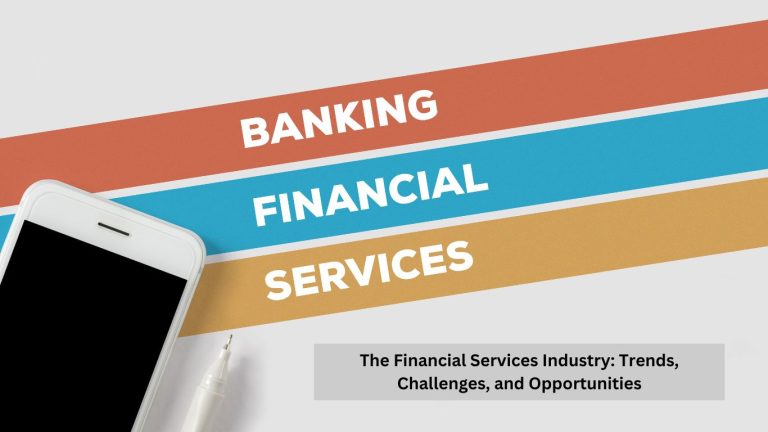The financial industry is undergoing rapid transformation. In today’s digital age, the financial industry faces new challenges and opportunities that are reshaping its landscape. As technology continues to advance, the financial industry must adapt to stay competitive and meet evolving customer expectations.
Experts expect the global financial industry to grow from $22.5 trillion in 2022 to $28.5 trillion by 2025, with a compound annual growth rate (CAGR) of 5.9%. Digital transformation, regulatory changes, and the rise of fintech companies are fueling this growth.
Key Trends Shaping the Financial Industry
This industry is heavily influenced by several key trends that are driving change. Understanding these trends is crucial for businesses looking to stay ahead in this dynamic market.
Digital Transformation
Digital transformation is at the heart of the changes in the financial industry. Financial institutions are increasingly adopting digital technologies to enhance customer experiences, streamline operations, and reduce costs. This includes everything from mobile banking apps to AI-powered customer service chatbots. Experts estimate that by 2023, over 80% of banking interactions will be digital, emphasizing the importance of a strong digital strategy.
Regulatory Changes
The financial industry is one of the most heavily regulated sectors. Regulatory changes are constantly being introduced to protect consumers and ensure the stability of financial markets. Staying compliant with these regulations is both a challenge and an opportunity for financial institutions to build trust with their customers. According to Deloitte, compliance costs in the financial industry have increased by 60% since 2008, highlighting the growing importance of regulatory adherence.
Fintech Disruption
Fintech companies are disrupting the financial industry by offering innovative solutions that challenge traditional banking models. From peer-to-peer lending platforms to cryptocurrency exchanges, fintech is driving competition and forcing established players to innovate. The global fintech market is projected to reach $460 billion by 2025, with a CAGR of 23.58%, underscoring the significant impact of fintech.
Challenges Facing the Financial Industry
While the financial industry is full of opportunities, it also faces significant challenges. These challenges must be addressed to maintain growth and stability.
Cybersecurity Threats
As the financial industry becomes more digitized, the risk of cyberattacks increases. Financial institutions must invest in robust cybersecurity measures to protect sensitive customer data and maintain trust. Cybersecurity is not just a technical challenge but also a critical aspect of maintaining customer confidence. A 2021 study by IBM revealed that the average cost of a data breach in the financial sector is $5.85 million, higher than in most other industries.
Compliance and Regulation
Navigating the complex web of regulations in the financial industry is a significant challenge. Non-compliance can result in hefty fines and damage to reputation. Financial institutions must stay informed about regulatory changes and implement necessary measures to ensure compliance. The cost of compliance has risen dramatically, with financial institutions spending over $270 billion globally in 2021 alone.
Customer Expectations
Today’s customers expect seamless, personalized experiences from their financial service providers. Meeting these expectations requires significant investment in technology and customer service. Companies in this industry must prioritize customer experience to stay competitive. A recent survey found that 72% of consumers would switch banks if they received poor customer service, highlighting the importance of customer satisfaction in the industry.
Opportunities in the Financial Industry
Despite the challenges, this industry is ripe with opportunities. Businesses that can adapt to the changing landscape stand to gain significantly.
Innovation and Technology Adoption
The adoption of new technologies presents a massive opportunity for growth in the financial industry. Financial institutions that embrace digital transformation can offer better services, reduce operational costs, and gain a competitive edge. From blockchain technology to AI-driven analytics, innovation is key to future success. McKinsey estimates that the implementation of AI in the financial industry could lead to savings of over $1 trillion by 2030.
Expansion into Emerging Markets
Emerging markets represent a significant growth opportunity for the financial industry. With increasing internet penetration and a growing middle class, these markets are ripe for financial services that cater to previously underserved populations. Companies that can effectively tap into these markets can achieve substantial growth. Emerging markets are expected to increase their financial inclusion rate by 45% over the next five years, opening new avenues for financial services..
Sustainable Finance
Sustainability is becoming a critical concern for investors and consumers alike. The financial industry has the opportunity to lead the way in sustainable finance by offering green bonds, socially responsible investment products, and other sustainable financial services. This not only meets growing consumer demand but also helps address global challenges like climate change. The global market for green bonds reached $500 billion in 2021, and it’s expected to grow further as more institutions prioritize sustainable finance.
The Role of Education and Talent Development
The future of the financial industry depends heavily on the availability of skilled professionals. As the industry evolves, so too must the skills of those working within it.
Building a Skilled Workforce
Education and continuous learning are essential for building a workforce that can navigate the complexities of the financial industry. Institutions must invest in training programs that keep their employees up to date with the latest industry trends and regulatory changes.
Engaging with Universities and Students
One way to ensure a steady pipeline of talent is by engaging with students and universities. Financial institutions can attract top talent and prepare them for the challenges of the financial industry by offering internships, mentorship programs, and real-world projects.
How Qollabb Can Help
Platforms like Qollabb are instrumental in connecting financial institutions with emerging talent. Qollabb enables businesses to engage with students through real-world projects, internships, and collaborative opportunities. This not only helps in building a skilled workforce but also drives innovation by bringing fresh ideas into the industry.
Conclusion
The financial industry is at a crossroads, with both significant challenges and exciting opportunities on the horizon. By embracing digital transformation, navigating regulatory changes, and investing in innovation, financial institutions can position themselves for success. Additionally, by engaging with students and focusing on talent development, businesses can ensure they have the skilled workforce needed to thrive in this rapidly changing industry.
Qollabb plays a crucial role in this process by connecting financial institutions with the next generation of professionals, ensuring that the financial industry remains dynamic, innovative, and future-ready.





